Formal and Informal expressions and words:
You must write a summary of at least 150 words in response to a specific graph (bar, line, or pie graph), table, chart, or procedure on the IELTS Academic test (how something works, how something is done). Few more informal expressions with their formal versions are given below. Since IELTS is a formal test, your writing should be formal as well. Using informal words or expressions should be avoided. Some of the informal words are so frequently used that it would be tough for you to eliminate them from your writing. However, we would suggest you make a habit of using
| Informal | Formal |
| Go up | Increase |
| Go down | Decrease |
| Look at | Examine |
| Find about | Discover |
| Point out | Indicate |
| Need to | Required |
| Get | Obtain |
| Think about | Consider |
| Seem | Appear |
| Show | demonstrate/
illustrate |
| Start | Commence |
| Keep | Retain |
| But | However |
| So | Therefore/ Thus |
formal words and expressions instead- for your performance and band score’s sake.
| Also | In addition/ Additionally |
| In the meantime | In the interim |
| In the end | Finally |
| Anyway | Notwithstanding |
| Lots of/ a lot of | Much, many |
| Kids | Children |
| Cheap | Inexpensive |
| Right | Correct |
| I think | In my opinion |
IELTS Writing Task 1 vocabulary:
Following are the vocabularies for Academic IELTS Writing Task 1 grouped as Noun, Verb, Adjective, Adverb, and Phrase to help you improve your vocabulary and understanding of the usages of these while describing a graph.
Noun:
Increase:
A growth: There was a growth in the earning of the people of the city at the end of the year. An increase: Between noon and evening, there was an increase in the temperature of the coast area and this was probably because of the availability of sunlight at that time.
A rise: A rise of the listener in the morning can be observed from the bar graph. An improvement: The data show that there was an improvement in the traffic condition between 11:00 am till 3:00 pm.
A progress: There was progress in the law and order of the city during the end of the last year.
Rapid Increase:
A surge: From the presented information, it is clear that there was a surge in the number of voters in 1990 compared to the data given for the previous years.
A rapid increase/ a rapid growth/ a rapid improvement: There was a rapid growth in the stock value of the company ABC during December of the last year.
N.B: Following adjectives can be used before the above nouns to show a rapid growth/ increase of something:
Rapid, Sudden, Steady, Noticeable, Mentionable, Tremendous, huge, enormous, massive, vast, gigantic, monumental, incredible, fabulous, great etc.
(The above list is the words which are actually adjective and can be used before nouns to show the big changes)
Highest:
A/ The peak: Visitors number reached a peak in 2008 and it exceeded 2 million.
Top/ highest/ maximum: The oil prices reached the top/ highest in 1981 during the war.
N.B: Some of the words to present the highest/ top of something are given below:
Apex, pyramid, zenith, acme, obelisk, climax, needle, spire, vertex, summit, tower, most, greatest, max, tops, peak, height, crown.
Changes:
A fluctuation: There was a fluctuation in the passenger numbers who used railway transportation during the year 2003 to 2004.
A variation: A variation in the shopping habit of teenagers can be observed from the data. A disparately/ dissimilarity/ an inconsistency: The medicine tested among the rabbits shows an inconsistency of the effect it had.
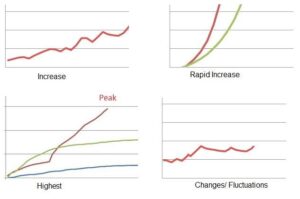
Steadiness:
Stability: The data from the line graph show the stability of the price in the retail market from January till June for the given year.
A plateau: As is presented in the line graph, there was a plateau of the oil price from 1985 to 1990.
Decrease:
A fall: There was a fall in the price of the energy bulbs in 2010 which was less than $5. A decline: A decline occurred after June and the production reached 200/day for the next three months.
A decrease: After the initial four years, the company’s share price increased, and there was a decrease in the bearish market.
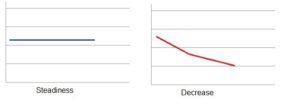
Using ‘Nouns’ and ‘Verbs’ to describe trends in a graph:
Direction:
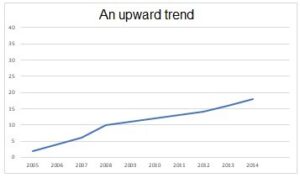
Verbs Nouns
» Increased (to) An increase
» Rose (to) A rise
» Climbed (to) An upward trend
» Went up (to) A growth
Direction:
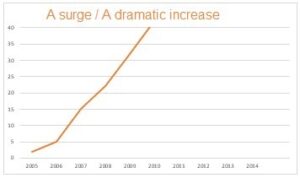
Verbs Nouns
» Surge A surge
» Boomed (to) A boom / a dramatic increase.
Direction:
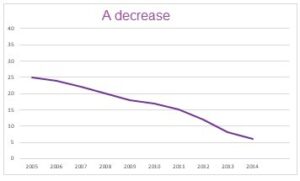
Verbs Nouns
» Decreased (to) A decrease
» Declined (to) A decline
» Fell (to) A fall
» Reduce (to) A reduction
» Dipped (to)
» Dropped (to) A drop
» Went down (to) A downward trend
Direction:
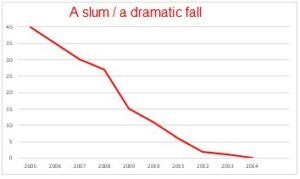
Verbs Nouns
» Plunge
» Slumped (to) A slum / a dramatic fall.
» Plummeted (to)
Direction:
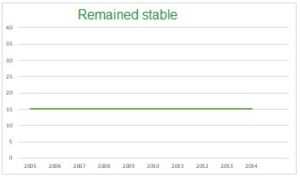
Verbs Nouns
» Remained stable (at)
» Remained static (at)
» Remained steady (at)
» Stayed constant (at)
» Levelled out (at) A level out
» Did not change No change
» Remained unchanged No change
» Maintained the same level
» Plateaued (at) A plateau
Direction:
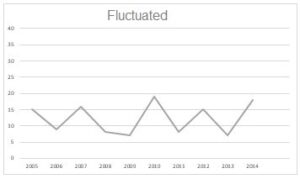
Verbs Nouns
» Fluctuated (around) A fluctuation
» Oscillated An oscillation
Direction:
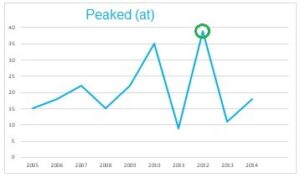
Verbs Nouns
» Peaked (at) The peak/ apex/ zenith/ summit/ the highest point
Direction:
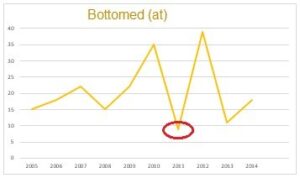
Verbs Nouns
» Bottomed (at) The lowest point/ the bottom/ bottommost point
Use ‘adjective/adverb’ to indicate the movement of a trend. Examples:
- There has been a slight increase in the unemployment rate in 1979 at which point it stood at 12%.
- The price of gold dropped rapidly over the next three years.
Use ‘adjective’ to modify the ‘Noun’ form of a trend and use ‘adverb’ to modify the ‘verb’ form of a trend.
Greater or Higher?
We usually use ‘greater’ when we compare two numbers, and ‘higher’ while comparing two percentages or ratio. Reversely, ‘smaller or fewer’ could be used to compare two numbers and
‘lower’ to compare two percentages or ratios. The following table would make it clear —

Examples:
- The number of male doctors in this city was greater than the number of female doctors. 2. The number of European programmers who attended the seminar was fewer than the number of Asian programmers.
- The percentage of male doctors in this city was higher than the percentage of female doctors.
- During 2010, the inflow of illegal immigrants was lower than that of 2012.
- the birth rate in Japan in 2014 was higher than the birth rate in 2015.
Vocabulary to compare to what extent / to (/by) what degree something is greater/higher than the other.
» Overwhelmingly, Substantially, Significantly. Considerably.
» Moderately, Markedly.
» Hardly, Barely, Slightly, Fractionally, Marginally.

0 Comments